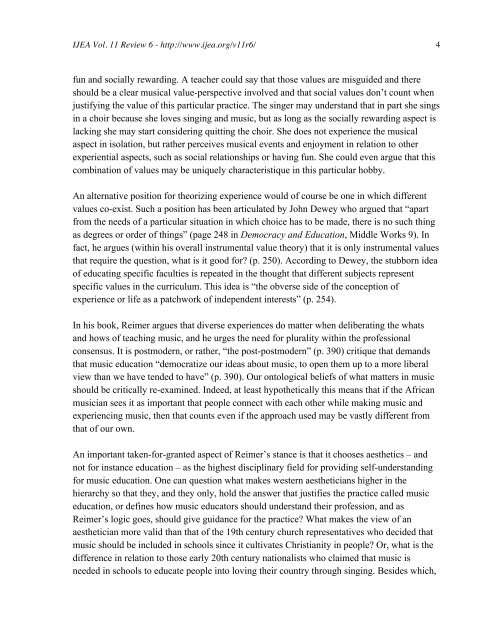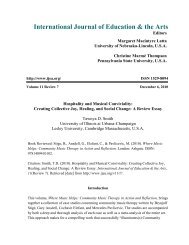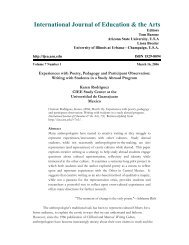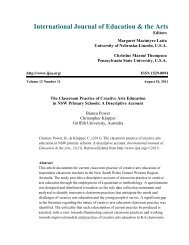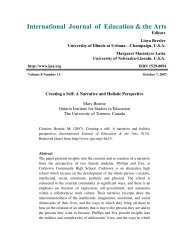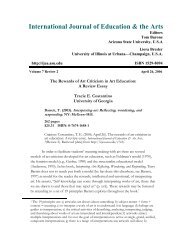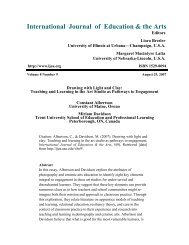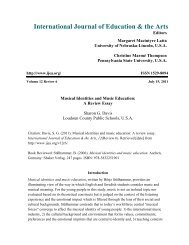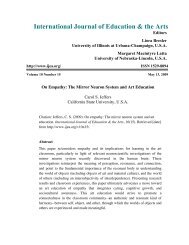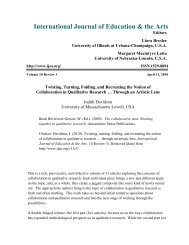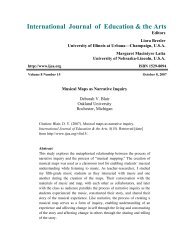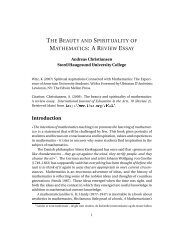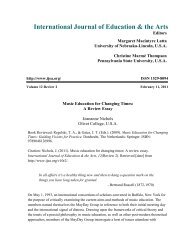This review essay is available in PDF format. - International Journal ...
This review essay is available in PDF format. - International Journal ...
This review essay is available in PDF format. - International Journal ...
You also want an ePaper? Increase the reach of your titles
YUMPU automatically turns print PDFs into web optimized ePapers that Google loves.
IJEA Vol. 11 Review 6 - http://www.ijea.org/v11r6/ 4<br />
fun and socially reward<strong>in</strong>g. A teacher could say that those values are m<strong>is</strong>guided and there<br />
should be a clear musical value-perspective <strong>in</strong>volved and that social values don’t count when<br />
justify<strong>in</strong>g the value of th<strong>is</strong> particular practice. The s<strong>in</strong>ger may understand that <strong>in</strong> part she s<strong>in</strong>gs<br />
<strong>in</strong> a choir because she loves s<strong>in</strong>g<strong>in</strong>g and music, but as long as the socially reward<strong>in</strong>g aspect <strong>is</strong><br />
lack<strong>in</strong>g she may start consider<strong>in</strong>g quitt<strong>in</strong>g the choir. She does not experience the musical<br />
aspect <strong>in</strong> <strong>is</strong>olation, but rather perceives musical events and enjoyment <strong>in</strong> relation to other<br />
experiential aspects, such as social relationships or hav<strong>in</strong>g fun. She could even argue that th<strong>is</strong><br />
comb<strong>in</strong>ation of values may be uniquely character<strong>is</strong>tique <strong>in</strong> th<strong>is</strong> particular hobby.<br />
An alternative position for theoriz<strong>in</strong>g experience would of course be one <strong>in</strong> which different<br />
values co-ex<strong>is</strong>t. Such a position has been articulated by John Dewey who argued that “apart<br />
from the needs of a particular situation <strong>in</strong> which choice has to be made, there <strong>is</strong> no such th<strong>in</strong>g<br />
as degrees or order of th<strong>in</strong>gs” (page 248 <strong>in</strong> Democracy and Education, Middle Works 9). In<br />
fact, he argues (with<strong>in</strong> h<strong>is</strong> overall <strong>in</strong>strumental value theory) that it <strong>is</strong> only <strong>in</strong>strumental values<br />
that require the question, what <strong>is</strong> it good for (p. 250). Accord<strong>in</strong>g to Dewey, the stubborn idea<br />
of educat<strong>in</strong>g specific faculties <strong>is</strong> repeated <strong>in</strong> the thought that different subjects represent<br />
specific values <strong>in</strong> the curriculum. <strong>Th<strong>is</strong></strong> idea <strong>is</strong> “the obverse side of the conception of<br />
experience or life as a patchwork of <strong>in</strong>dependent <strong>in</strong>terests” (p. 254).<br />
In h<strong>is</strong> book, Reimer argues that diverse experiences do matter when deliberat<strong>in</strong>g the whats<br />
and hows of teach<strong>in</strong>g music, and he urges the need for plurality with<strong>in</strong> the professional<br />
consensus. It <strong>is</strong> postmodern, or rather, “the post-postmodern” (p. 390) critique that demands<br />
that music education “democratize our ideas about music, to open them up to a more liberal<br />
view than we have tended to have” (p. 390). Our ontological beliefs of what matters <strong>in</strong> music<br />
should be critically re-exam<strong>in</strong>ed. Indeed, at least hypothetically th<strong>is</strong> means that if the African<br />
musician sees it as important that people connect with each other while mak<strong>in</strong>g music and<br />
experienc<strong>in</strong>g music, then that counts even if the approach used may be vastly different from<br />
that of our own.<br />
An important taken-for-granted aspect of Reimer’s stance <strong>is</strong> that it chooses aesthetics – and<br />
not for <strong>in</strong>stance education – as the highest d<strong>is</strong>cipl<strong>in</strong>ary field for provid<strong>in</strong>g self-understand<strong>in</strong>g<br />
for music education. One can question what makes western aestheticians higher <strong>in</strong> the<br />
hierarchy so that they, and they only, hold the answer that justifies the practice called music<br />
education, or def<strong>in</strong>es how music educators should understand their profession, and as<br />
Reimer’s logic goes, should give guidance for the practice What makes the view of an<br />
aesthetician more valid than that of the 19th century church representatives who decided that<br />
music should be <strong>in</strong>cluded <strong>in</strong> schools s<strong>in</strong>ce it cultivates Chr<strong>is</strong>tianity <strong>in</strong> people Or, what <strong>is</strong> the<br />
difference <strong>in</strong> relation to those early 20th century national<strong>is</strong>ts who claimed that music <strong>is</strong><br />
needed <strong>in</strong> schools to educate people <strong>in</strong>to lov<strong>in</strong>g their country through s<strong>in</strong>g<strong>in</strong>g. Besides which,


